Inspector Joseph French is a fictional British private detective created by Freeman Wills Crofts. He was one of the prominent detectives of the Golden Age of Detective Fiction, appearing in twenty nine novels and a number of short stories between 1924 and 1957. French is a Scotland Yard detective, whose methodical technique breaks down complex alibis. Over the series he is promoted to Chief Inspector and the later to Superintendent. His manner is courteous, he is a happily married and has no major problems in in his private life. The series relied largely on puzzle mysteries.
The Paddington Mystery is a 1925 detective novel by John Rhode, the pen name of the British writer Cecil Street. It marked the first appearance of the Lancelot Priestley, who featured in a long-running series of novels during the Golden Age of Detective Fiction. A scientific genius, Priestley is an armchair detective who can solve a mystery without actually visiting the scene of the crime.
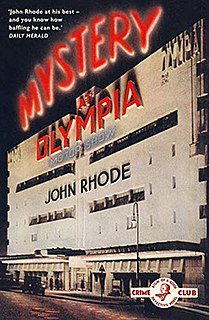
Mystery at Olympia is a 1935 detective novel by John Rhode, the pen name of the British writer Cecil Street. It is the twenty second in his long-running series of novels featuring Lancelot Priestley, an armchair detective who was able to solve mysteries without visiting the scene of the crime. It was published in the United States under the alternative title Murder at the Motor Show.

Hendon's First Case is a 1935 detective novel by John Rhode, the pen name of the British writer Cecil Street. It is the twenty first in his long-running series of novels featuring Lancelot Priestley, a Golden Age armchair detective. The novel introduced the character Inspector Jimmie Waghorn, a graduate of the newly established Hendon Police College. Over time Waghorn would increasingly become the dominant figure of the series, taking over the role from Priestley who took up a smaller, advisory role.

Death at Breakfast is a 1936 detective novel by John Rhode, the pen name of the British writer Cecil Street. It is the twenty third in his long-running series of novels featuring Lancelot Priestley, a Golden Age armchair detective. It received a negative review from Cecil Day-Lewis, writing as Nicholas Blake in The Spectator noting "Some attempt is made to establish the character of the victim, but the remaining dramatis personae are stuffed men".

In Face of the Verdict is a 1936 detective novel by John Rhode, the pen name of the British writer Cecil Street. It is the twenty fourth in his long-running series of novels featuring Lancelot Priestley, a Golden Age armchair detective. Unusually in the series Priestley takes a more active role in the investigation himself, rather than solving it from a detached distance. It was not published in the United States until 1940, by Dodd Mead, with the slightly altered title of In the Face of the Verdict.

Death in the Hopfields is a 1937 detective novel by John Rhode, the pen name of the British writer Cecil Street. It is the twenty fifth in his long-running series of novels featuring Lancelot Priestley, a Golden Age armchair detective. It was published in America by Dodd Mead under the alternative title The Harvest Murder.

Invisible Weapons is a 1938 detective novel by John Rhode, the pen name of the British writer Cecil Street. It is the twenty eighth in his long-running series of novels featuring Lancelot Priestley, a Golden Age armchair detective. A locked room mystery, the title revolves around the fact that two murders are committed by apparently invisible methods.

Murder at Lilac Cottage is a 1940 detective novel by John Rhode, the pen name of the British writer Cecil Street. It is the thirty third in his long-running series of novels featuring Lancelot Priestley, a Golden Age armchair detective. In the Times Literary Supplement reviewer Maurice Willson Disher noted "With both ingenuity and originality at command, he will keep puzzle-solvers guessing until it pleases Dr. Priestley to explain why clues are not what they seem." while Ralph Partridge gave it a broadly positive review in the New Statesman.
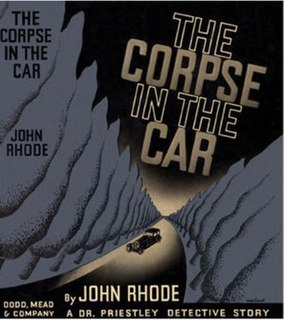
The Corpse in the Car is a 1935 detective novel by John Rhode, the pen name of the British writer Cecil Street. It is the twentieth in his long-running series of novels featuring Lancelot Priestley, a Golden Age armchair detective. A review by Ralph Partridge in the New Statesman commented "Mr. Rhode has written a humdrum, workaday book in The Corpse in the Car. He belongs to the English school of Freeman Wills Crofts, with which it is impossible to find technical fault." In The Spectator Rupert Hart-Davis considered that "The Corpse in the Car is greatly inferior to his last book, Shot at Dawn."
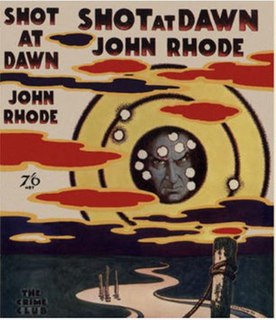
Shot at Dawn is a 1934 detective novel by John Rhode, the pen name of the British writer Cecil Street. It is the nineteenth in his long-running series of novels featuring Lancelot Priestley, a Golden Age armchair detective. It was one of the best received novels in the series. In a review in the Sunday Times Dorothy L. Sayers wrote "Mr. John Rhode is one of those kind, thoughtful writers who patiently explain all the technical points of the narrative in words that a child could understand." Ralph Partridge in the New Statesman observed "Shot At Dawn is developed in that incalculable way which keeps one’s attention at the stretch, until the very last page—I actually got a thrill out of the verdict of the jury! The Crime Club has selected the book, and I certainly could not better their selection from the detective novels that have come my way in the last few months."

Poison for One is a 1934 detective novel by John Rhode, the pen name of the British writer Cecil Street. It is the eighteenth in his long-running series of novels featuring Lancelot Priestley, a Golden Age armchair detective. It combines elements of the locked room mystery and country house mystery. Reviewing the book in the Sunday Times leading crime writer Dorothy L. Sayers considered it "as usual, sound, pleasantly written, and entertaining" although she complained the book "was rather spoilt for me by the jacket, which deliberately gives away one-half of the solution."
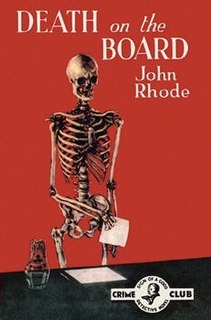
Death on the Board is a 1937 detective novel by John Rhode, the pen name of the British writer Cecil Street. It is the twenty sixth in his long-running series of novels featuring Lancelot Priestley, a Golden Age armchair detective. It was published in the United States by Dodd Mead under the slightly altered title Death Sits on the Board.

Death of an Author is a 1947 detective novel by John Rhode, the pen name of the British writer Cecil Street. It is the forty fifth in his long-running series of novels featuring Lancelot Priestley, a Golden Age armchair detective. The New Yorker described it as "Rather pleasant, in a ponderous fashion" while Will Cuppy, writing in the New York Herald Tribune, felt "Mr. Rhode provides one of those satisfying British stories in the old tradition, full of mystery meat and brain-work."
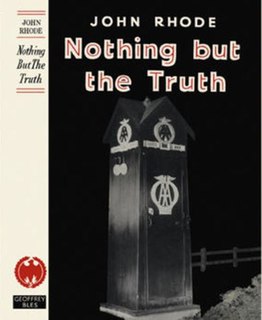
Nothing But the Truth is a 1947 detective novel by John Rhode, the pen name of the British writer Cecil Street. It is the forty forth in his long-running series of novels featuring Lancelot Priestley, a Golden Age armchair detective.

Death in Harley Street is a 1946 detective novel by John Rhode, the pen name of the British writer Cecil Street. It is the forty third in his long-running series of novels featuring Lancelot Priestley, a Golden Age armchair detective. Several sources consider it to be the author's masterpiece.
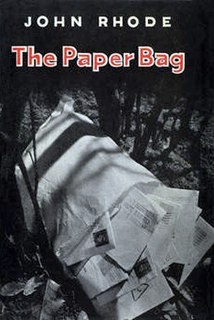
The Paper Bag is a 1948 detective novel by John Rhode, the pen name of the British writer Cecil Street. It is the forty sixth in his long-running series of novels featuring Lancelot Priestley, a Golden Age armchair detective. It was published in America by Dodd Mead under the alternative title The Links in the Chain.

The Two Graphs is a 1950 detective novel by John Rhode, the pen name of the British writer Cecil Street. It is the fiftieth in his long-running series of novels featuring Lancelot Priestley, a Golden Age armchair detective. It was published in America by Dodd Mead under the alternative title Double Identities. Writing in The Observer Maurice Richardson noted a "slight slackening of tension towards the finish but an excellent specimen of Rhode’s later period."
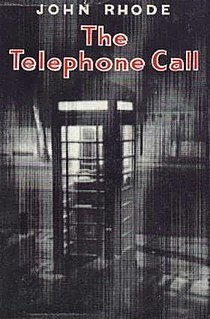
The Telephone Call is a 1948 detective novel by John Rhode, the pen name of the British writer Cecil Street. It is the forty seventh in his long-running series of novels featuring Lancelot Priestley, a Golden Age armchair detective. It was published in America by Dodd Mead under the alternative title Shadow of an Alibi. It is based on the real-life Wallace Case of 1931 in which William Herbert Wallace was convicted of murdering his wife Julia, a conviction which was later overturned on appeal.
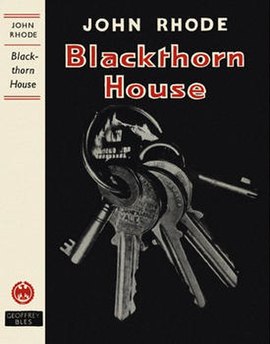
Blackthorn House is a 1949 detective novel by John Rhode, the pen name of the British writer Cecil Street. It is the forty eighth in his long-running series of novels featuring Lancelot Priestley, a Golden Age armchair detective.


















